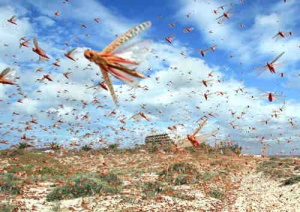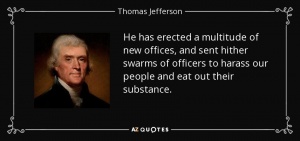Template:Locust: Difference between revisions
m (→Cankerworm) |
m (→Locust) |
||
| Line 5: | Line 5: | ||
[[Locust]] are associated with [[cankerworm]], [[caterpillar]], [[grasshopper]]s, [[palmerworm]], | [[Locust]] are associated with [[cankerworm]], [[caterpillar]], [[grasshopper]]s, [[palmerworm]], | ||
We see numerous occurrences of the word [[locust]] in the Bible. These are most often metaphors where these references are talking about things that are "like the cankerworm", or "like [[grasshopper]]s", or "[like] the gathering of the [[caterpiller]]". [[Locust]] and [[grasshopper]]s are like other images we see in the biblical text which provide symbols which are used to express spiritual principles. Like that seen in the stories surrounding [[Graven images]], [[idols]], [[idolatry]], [[golden calf]], and even national [[adultery]] all had to do with systems of governments of the [[world]]s men create for themselves which were contradictory to [[the way]]s of [[Christ]] and [[God]]. | We see numerous occurrences of the word [[locust]] in the Bible. These are most often metaphors where these references are talking about things that are "like the cankerworm", or "like [[grasshopper]]s", or "[like] the gathering of the [[caterpiller]]". [[Locust]]s and [[grasshopper]]s are like other images we see in the biblical text which provide symbols which are used to express spiritual principles. Like that seen in the stories surrounding [[Graven images]], [[idols]], [[idolatry]], [[golden calf]], and even national [[adultery]] all had to do with systems of governments of the [[world]]s men create for themselves which were contradictory to [[the way]]s of [[Christ]] and [[God]]. | ||
== Cankerworm == | == Cankerworm == | ||
Revision as of 07:10, 24 February 2023

Locust
Locust are associated with cankerworm, caterpillar, grasshoppers, palmerworm,
We see numerous occurrences of the word locust in the Bible. These are most often metaphors where these references are talking about things that are "like the cankerworm", or "like grasshoppers", or "[like] the gathering of the caterpiller". Locusts and grasshoppers are like other images we see in the biblical text which provide symbols which are used to express spiritual principles. Like that seen in the stories surrounding Graven images, idols, idolatry, golden calf, and even national adultery all had to do with systems of governments of the worlds men create for themselves which were contradictory to the ways of Christ and God.
Cankerworm
Nahum 3:15 There shall the fire devour thee; the sword shall cut thee off, it shall eat thee up like the cankerworm[1]: make thyself many as the cankerworm[1], make thyself many as the locusts[2].
Nahum 3:16 Thou hast multiplied thy merchants above the stars of heaven: the cankerworm[1] spoileth, and flieth away.
Joel 2:25 And I will restore to you the years that the locust hath eaten, the cankerworm <03218>, and the caterpiller, and the palmerworm, my great army which I sent among you.
Grasshopper

Nahum 3:17 Thy crowned[3]are as the locusts[2], and thy captains as the great grasshoppers[4], which camp in the hedges in the cold day, but when the sun ariseth they flee away, and their place is not known where they are.
The term crowned is translated commander and guardsmen in other versions and is said to be from the letters MemNunZayinReish 04502 which only appears in Nahum 3:17. In the original text it is written as MemNunZayinReishYodKuf in reference to swarming locusts from 0697 with the letters AlefReishBeitHey.
The text also says the generals which normally appears as TetPieSamechReish but appearing as VavTetPieSamechReishYodKaf, These generals are said to be like grasshoppers using the Hebrew letters GimelVavBeit from 01462 written in the original text as KafGimelVavBeit.
Terms like locust and grasshopper are often used to denote swarms of anything that does damage or eats up the crops or things we produce with out sweat, toil and labor that sustain us and our families.
Even in the Declaration of Independence we see the reference to a listed complaint about the Crowned king of Great Britain where "He has erected a multitude of New Offices, and sent hither swarms of Officers to harrass our people, and eat out their substance."
It should be evident that the Bible often uses the same types of metaphor to express the devouring nature of kings, rulers and their officers who exercise authority one over the other especially when the people return to the bondage of Egypt or eat at the tables of Babylon engaging in the covetous practices of the Cains, Nimrods, Caesars, and FDRs of the "worlds" we create for ourselves through Contracts, Covenants, and Constitutions.
We are warned in the Old and New Testaments that these tables of rulers are a snare and if we have an appetite for their dainties, which are the wages of unrighteousness, we will be made merchandise and curse children.
Caterpillers
But as caterpillers in Psalms 78:46 He gave also their increase unto the caterpiller, and their labour unto the locust.
Psalms 105:34 He spake, and the locusts came, and caterpillers <03218>, and that without number,
Jeremiah 51:14 The LORD of hosts hath sworn by himself, [saying], Surely I will fill thee with men, as with caterpillers <03218>; and they shall lift up a shout against thee.
Jeremiah 51:27 Set ye up a standard in the land, blow the trumpet among the nations, prepare the nations against her, call together against her the kingdoms of Ararat, Minni, and Ashchenaz; appoint a captain against her; cause the horses to come up as the rough caterpillers <03218>.
Isaiah 33:4 And your spoil shall be gathered [like] the gathering of the caterpiller: as the running to and fro of locusts shall he run upon them.
Palmerworm
Amos 4:9 I have smitten you with blasting and mildew: when your gardens and your vineyards and your fig trees and your olive trees increased, the palmerworm[5] devoured them: yet have ye not returned unto me, saith the LORD.
Joel 1:4 That which the palmerworm hath left hath the locust eaten; and that which the locust hath left hath the cankerworm <03218> eaten; and that which the cankerworm <03218> hath left hath the caterpiller eaten.
- ↑ 1.0 1.1 1.2 03218 ^קלי^ yekeq \@yeh’- lek\@ from an unused root meaning to lick up; n m; {See TWOT on 870 @@ "870a"} AV-cankerworm 6, caterpillar 3; 9
- 1) young locust (early stage of development)
- 1a) caterpillar (as devouring)
- 1) young locust (early stage of development)
- ↑ 2.0 2.1 0697 ^הברא^ ‘arbeh \@ar-beh’\@ AlefReshBeitHey said to be from רָבָה rabah ReshBeitHey 07235 which means "be or become great, be or become many, be or become much, be or become numerous"; n m; {See TWOT on 2103 @@ "2103a"} AV-locust 20, grasshopper 4; 24 a.k.a. the swarming locust
- 1) a kind of locust, locust swarm (coll)
- 2) (CLBL)
- 2a) sudden disappearance (fig.)
- 2b) insignificance (fig.)
- 2c) activity (fig.)
- Note:
- ↑ 04502 מִנְּזָר MemNunZayinReish minnëzar [min-ez-awr’] or (plural) מנזרים
from 05144 NunZayinReish separated or dedicated; n m; [BDB-634b] [{See TWOT on 1340 @@ "1340d" }] AV-crowned 1; 1
- 1) princes, anointed ones, consecrated ones
- 1a) meaning dubious
- MemNunZayinReish 04502 only appears in Nahum 3:17 but written as MemNunZayinReishYodKuf in reference to swarming locusts AlefReishBeitHey (from 0697) where it also says the generals which normally appears as TetPieSamechReish appears as VavTetPieSamechReishYodKaf and are said to be like like grasshoppers using GimelVavBeit from 01462 written in the original text as KafGimelVavBeit.
- 1) princes, anointed ones, consecrated ones
- ↑ 01462 גּוֹב GimelVavBeit gowb [gobe] from 01461 GimelVavBeit guwb meaning husbandman; n m coll; [BDB-146b] [{See TWOT on 304 @@ "304b" }] AV-grasshopper 2; 2
- 1) locusts
- How is a word that means a husbandman become a locust or grasshopper.
- Amos 7:1 Thus hath the Lord GOD shewed unto me; and, behold, he formed grasshoppers <01462> in the beginning of the shooting up of the latter growth; and, lo, [it was] the latter growth after the king’s mowings.
- It appears in this form כְּג֣וֹב גֹּבָ֑י in Nahum 3:17 Thy crowned [are] as the locusts, and thy captains as the great grasshoppers <01462>, which camp in the hedges in the cold day, [but] when the sun ariseth they flee away, and their place is not known where they [are].
- Other words for grasshopper are 02284 ChetGimelBeit and 0697 AlefReshBeitHey from rabah ReshBeitHey 07235 which means "to become numerous".
- ↑ 01501 ^םזג^ GimelZayinMem gazam \@gaw-zawm’\@ from an unused root meaning to devour; n m coll; {See TWOT on 338 @@ "338a"} AV-palmerworm 3; 3 a.k.a. the chewing locust
- 1) locusts
- Another word for Locust. ^הברא^ ‘arbeh 0697 from הבר rabah 07235 meaning multiply "become many"
- GimelZayinZayin 01494 and 01495 means to shear.
- GimelZayinLamed 01497AV-spoil 8, take away 8, rob 4, pluck 3, caught 1, consume 1, exercised 1, force 1, pluck off 1, torn 1, violence 1; 30. means to tear away, seize, plunder, tear off, pull off, rob, take away by force
- GimelZayinLamedHey 01500 AV-violence 3, robbed 1, that 1, spoil 1; 6. means 1) plunder, spoil, robbery